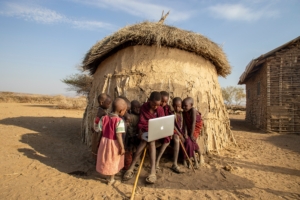
When I was a little kid in the 1970s, my father would show his slides of Africa from time to time to our visitors. There was one photo that he always highlighted on purpose: a photo of the Jumo Kenyatta Convention Center. The building looked like a modern skyscraper. “I show this because people think everyone in Africa lives in huts and that there are no cities,” he told me. At the time, it was true. Most people around the world thought Africa was completely rural and full of starving poor people. Today, 50 years later, hopefully most people around the world are aware that Africa is primarily urban, has a fast-growing middle class, has embraced technology and is producing millionaires and billionaires. But Africa will soon enter a new challenging phase as it deals with an urban population that grows to be as large as China and India combined.
When China urbanized between 1980 and 2000, it changed our world. China integrated into the global economy, its geo-political influence grew, it led to new global environmental concerns as well as a massive need for natural resources, and it even gave us global epidemics to deal with. Now Africa is on pace to surpass China’s urbanization with at least nine cities that will soon have 60 million people each (Greater New York City has 18 million).
The urbanization of Africa has brought some measure of advancement. Today in Kenya, they are more advanced in daily fintech use than the United States, they are a tech hub, and they already have high-speed rail. Who would have thought in the 1980s that Ethiopia, the country that became synonymous with malnourished, starving, babies, would have a top-of-the-line, global airline and serve as a hub for all of Africa. A journey across Africa will yield many pleasant surprises to visitors who have outdated stereotypes about Africa being “primitive.”
Nevertheless, Africa’s infrastructure is still sub-par, it has still not become a key manufacturing hub, and it has not become a leader in green technology and experimentation (especially in regard to solar power considering Africa’s abundance of sunlight). Africa has a natural disadvantage economically due to its geography as well. Nearly half of the continent is desert and there are more natural harbours between Boston and northernmost Maine than in all of Africa. The lack of connection to global shipping is a serious limitation.
Local government in Africa tends to be very weak. Unlike China, where local provincial leaders and city mayors pushed their people toward innovation and created global trading partners, African countries tend to be very centralized or far too disconnected. Many countries have seen advancment to their infrastructure mostly come from Chinese investment, which is mainly concerned with securing Africa’s natural resources.
Then there is the issue of Africa’s population being so young. It is estimated that 57 percent of global population growth through 2050 will occur in Africa. Almost 60 percent of the continent’s population is under the age of 25. The good news is that mortality rates are way down in Africa. There are far fewer people dying due to famine, war, disease or in childbirth than ever before. But that also creates a challenge with 11 million youth seeking jobs each year. A steep divide between rich and poor could easily grow to the point that Africa becomes a continent of gated communities and angry, revolutionary youth.
Another issue is climate change. While it’s easy for Westerners to minimize climate change and heat waves, on a continent where electricity may not be accessible daily and few have air conditioning, longer, more intense heat waves would be deadly. This will lead to more migration, which could cause more ethnic tension in small African countries where the local population can easily get over-run and outnumbered. The countries of West Africa are already seeing French-speaking areas become more English-speaking. Ethnic tensions can easily lead to war and a refugee crisis. Already, Europe is expecting more waves of refugees.
Obviously, Africa is not one country or monolithic, rather it is many different countries and ethnic groups all with their particularities that should be taken seriously and on their own accord. But continents affect the world. The good news is that Africa has far exceeded expectations in the past two decades. With such a large youthful population, adaptation to the next wave of technological adoption could come very easily indeed. The African diaspora has gotten considerably more wealthy, and African countries are learning how to navigate the influence of China and other assertive powers. The best thing that could probably happen for the continent would be focusing on educational and entrepreneurial opportunties for young girls and women throughout the continent. It has been said that the most gifted entrepreneurial people in the world are African mothers–always having to invent and make-do with limited resources. Regardless of where Africa is headed, my father’s slides of buildings in Africa should no longer be needed. Africa is on the world stage.
